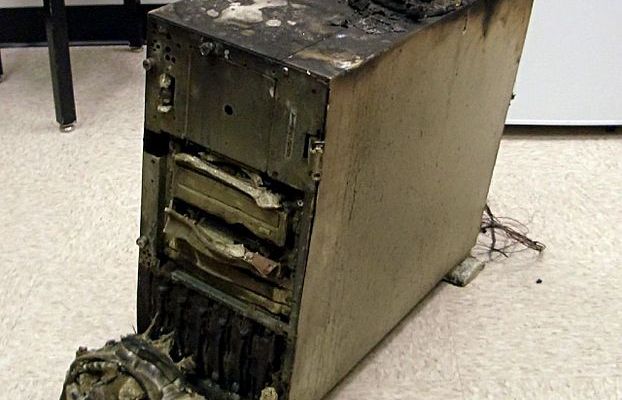Image Source: Wikimedia Commons – A server destroyed by a fire.
I’m Hosted in the Cloud? Why Do My Own Backups?
As more small businesses embrace cloud-based apps, a common assumption we them them making is that making data backups is an obsolete function associated with the bygone “IT-guy”. With the convenience and elasticity of cloud storage, you no longer need in-house IT administration staff, and therefore IT administrative policies like backup, security and recovery can be ignored. Everything’s in the cloud, and your cloud provider is responsible for everything. Right?
The reverse is true. In fact, the old wisdom of keeping multiple backups of your data is even more important today, especially for small businesses that depend on their web or email servers for critical business operations.
Here are two common “miss”-assumptions business should not be making.
My Provider is Responsible For Everything (And Global Warming)
It’s tempting to be lazy and claim that your web hosting or storage provider is your whole IT department. Please know that web hosting is not data storage, and data storage is not backup. All three service types serve different functions to your organisation and your service provider, whether a cloud, web-hosting or other, is responsible for whatever is stipulated in their service agreement. And more often than not, service providers will have a service agreement clause telling you that they are not liable for loss of data. Additionally, providers have been known to lose customer’s data even without system failure, as this photographer famously found, to his detriment.
Even if financial compensation is something you count on in the event of loss, what are you going to do if the damage is done? Taking the responsibility for business continuity and data recovery into own hands is a better way to protect the business from unpredictable situations.
Secondly, backup systems are not just for the crisis of system or hardware failure. They also facilitate the recovery of data in the event of data loss for any reason. After all, the ability to recover quickly when data is lost means that your business can go back to normal more quickly.
Here are 5 reasons back up and data recovery procedures should be a priority to any business.
1. Simple Human Error: Deliberate or Accidental
Data erasure can occur as a result of issues from re-installation, upgrading of systems, or simply a combination of a tired brain and accidental error. Files and whole directories can be overwritten, doing large-scale damage in a short amount of time.
Even more disturbing is that data loss also occurs from actions taken by “insiders” – organisation employees or others. Backup systems will save you hours or months of resources in reconstructing valuable data.
2. Virus, malware and spyware, ransomware and other attacks
Viruses, attacks, malware and ransomware are ever present risks in today’s landscape of cyberthreats. They present a high risk to continuity of business operations, wreaking havoc on systems, causing errors, lockups and loss of data.
A reliable backup system can restore data that has been lost through virus infection when used in conjunction with good virus detection software and an earlier backup.
3. Running out of Disk Space, or Archival Requirements
In today’s data hungry environment, data records grow fast, and with the increased need for large amounts of storage for everything from images to video all kinds of online documents. Offloading inactive or less-used files from your server to a secondary storage medium or third-party storage accounts may actually save cloud computing costs and contribute to maintaining system efficiency and organization, freeing up system space for current use.
Keeping backups is sometimes also required for archival or generic record-keeping, especially for audit, tax or other vendor or legal compliance purposes.
4. Don’t forget the “disaster” in Disaster Recovery
The effects of natural and man-made disasters such as floods, fires, earthquakes, or even theft, can be devastating to any enterprise that integrates large amounts of data storage into its daily operations. Can your business survive occurrences like these? Regenerating vital customer, inventory or internal information would be difficult from paper records, the effect of complete loss of electronic records on the reputation and revenue of the company might be worse. taking large amounts of time and resources if not impossible. Backup systems protect organisations against data calamities and the more detailed and current backup, the better the competitive advantage.
5. It May Be Cheaper
In the event of a crisis, the act of rebuilding may be costly and resource-draining. Any process of recovering from data loss involves redoing work, setting up systems, recreating spreadsheets or other documents and replicating or re-sourcing data. For many small businesses, such effort can severely affect any ability to recover quickly and competitively. Having backups, even if they are extremely old, will put you steps ahead on the road to re-smooth continuation and survival of your business. If your system goes, your data stays — it may mean the difference between business as usual and bankruptcy.
Do you have a comment about this article? We would love to hear from you.




















